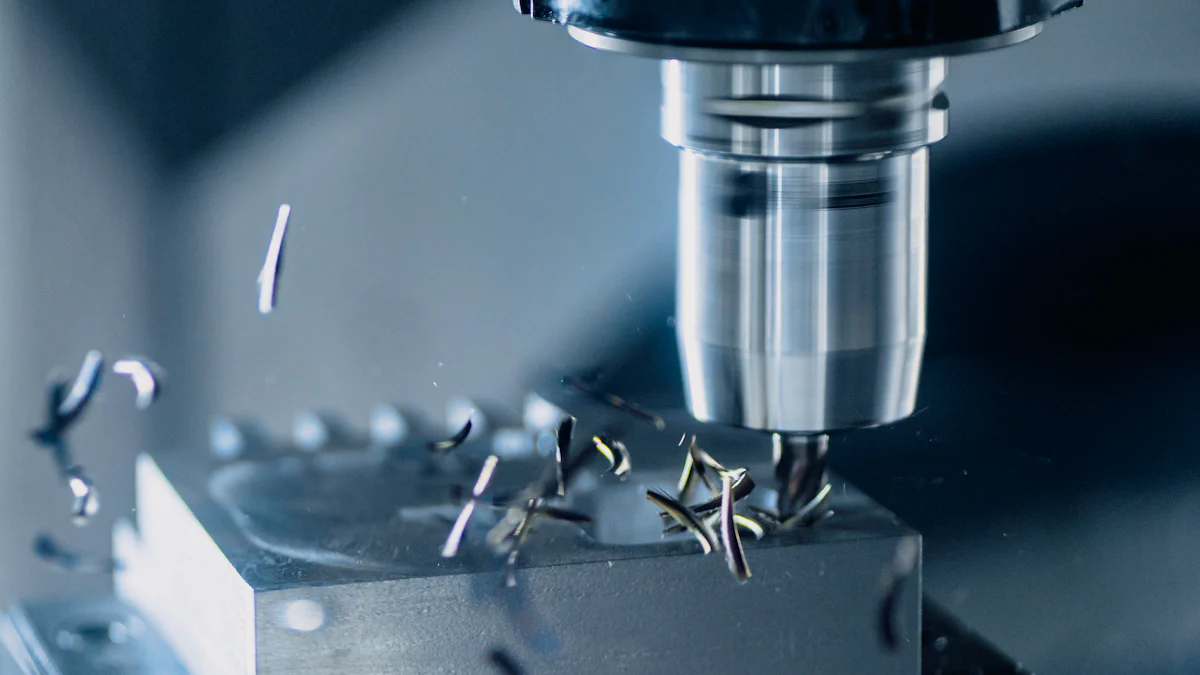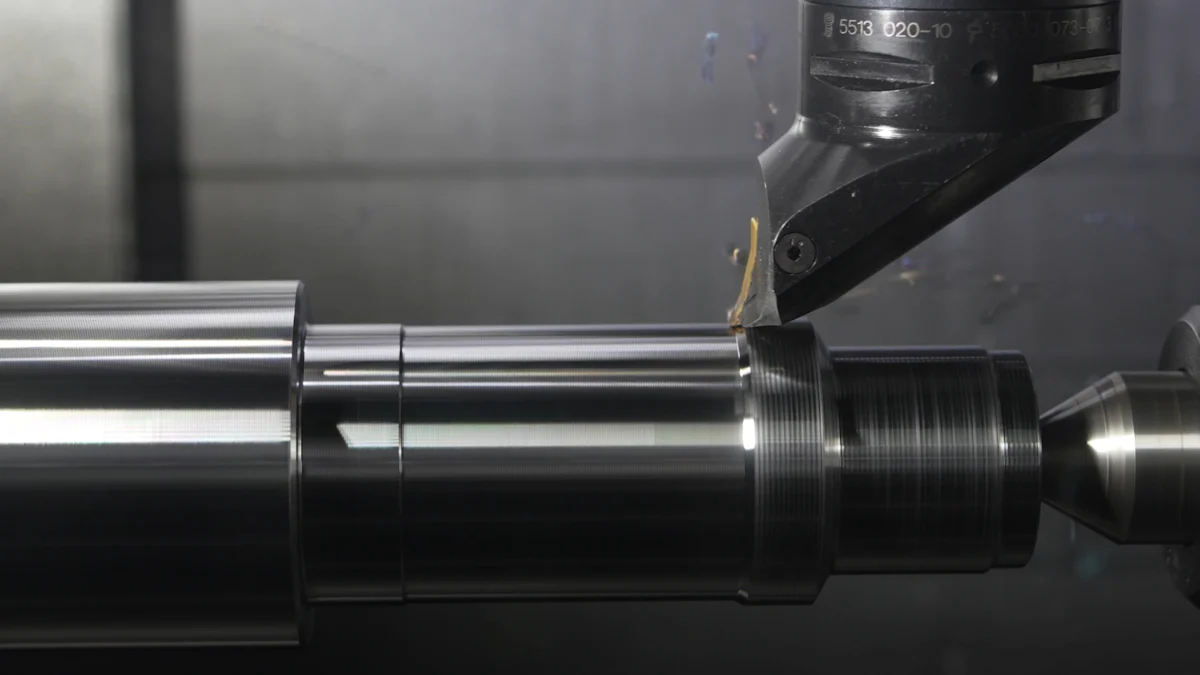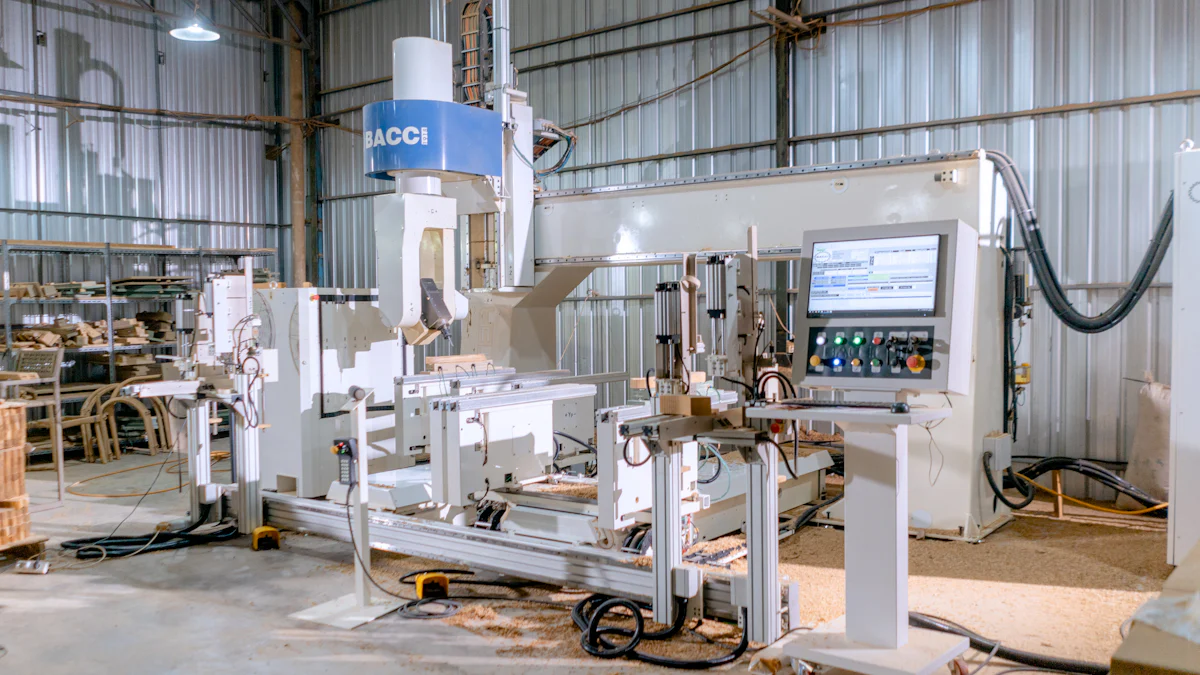Why CNC Machining is Cost-Effective for Small-Batch Production

When you’re looking for a cost-effective way to handle small-batch production, CNC machining stands out as a game-changer. It offers unmatched precision and flexibility, making it easy to adapt to design changes or meet unique customer demands. Unlike traditional methods, CNC machines can run continuously with minimal supervision, cutting down production time and labor costs. Plus, they align production with real-time demand, reducing waste and inventory expenses. This efficiency not only saves money but also supports environmentally responsible manufacturing. Whether you’re prototyping or producing niche products, CNC machining gives you the competitive edge you need.
Key Takeaways
CNC machining is very precise and flexible. It easily adapts to design changes in small-batch production.
This process lowers labor costs by using automation. One operator can handle many machines at once.
CNC machining reduces material waste with smart cutting paths. This helps make manufacturing better for the environment.
It allows quick prototyping, so businesses can test and improve designs fast before making more products.
CNC machining saves money for small production runs. It removes the need for costly molds and lowers production costs.
The Versatility of CNC Machining for Small-Batch Production

Adapting to Various Materials
Metals, plastics, and composites
CNC machining works with a wide range of materials, making it incredibly versatile for small-batch production. Whether you're working with metals like aluminum, stainless steel, or titanium, or plastics such as acrylic and polycarbonate, CNC machines handle them all with precision. They also excel with composites like carbon fiber and fiberglass, as well as wood and foam. This flexibility allows you to choose the best material for your project without limitations.
Handling diverse material properties
Different materials have unique properties, and CNC machining adapts to these with ease. For instance, metals require high cutting speeds and durability, while plastics demand gentler handling to avoid warping. CNC technology ensures that each material is processed with the right techniques, giving you consistent results regardless of the material's complexity.
Applications in Low Volume CNC Machining
Prototyping and product development
Low volume CNC machining is perfect for prototyping. You can quickly create functional prototypes for consumer electronics, medical devices, or even automotive parts. This allows you to test and refine your designs before committing to full-scale production. The speed and accuracy of CNC machining make it a go-to solution for product development.
Custom and niche product manufacturing
If you're producing custom or niche products, CNC machining is your best friend. It enables you to manufacture unique designs, like custom aerospace components or high-precision parts for research and development. You can also cater to startups or businesses needing on-demand manufacturing for market testing. This adaptability makes CNC machining a powerful tool for low-volume runs.
Scalability for Cost-Effectiveness in Small Batches
Seamless transition from prototyping to production
One of the biggest advantages of CNC machining is its scalability. You can start with a prototype and seamlessly transition to small-batch production without changing the process. This saves time and ensures consistency across all stages of manufacturing.
Efficient for low-volume runs
CNC machining is designed for efficiency, even in low-volume runs. It streamlines processes, reduces costs, and enhances product quality. This agility gives you a competitive edge, especially in markets that demand quick adjustments and high-quality results.
High Precision and Consistency in CNC Machining

Achieving Tight Tolerances
Uniformity across all parts
When you’re producing small batches, maintaining uniformity is crucial. CNC machining ensures every part meets the same high standards, no matter how complex the design. This level of precision eliminates inconsistencies, so you can deliver products that meet customer expectations every time.
Meeting exact specifications
CNC machining tolerances define how much a part’s dimensions can vary. For example, tolerances as tight as ±0.005″ are achievable with routers, lathes, and milling machines. While tighter tolerances demand more time and resources, standard tolerances strike a balance between cost and precision. This flexibility lets you meet exact specifications without overspending.
Automation for Cost-Effective Production
Reducing human error
Automation plays a huge role in keeping costs low. CNC machines operate with minimal human intervention, which reduces the chances of mistakes. By relying on automated systems, you can avoid costly errors and ensure consistent results across all parts.
Enhancing repeatability
CNC machines can run 24/7 with little downtime. They optimize spindle utilization and maintain repeatability, even during long production cycles. This means you can produce identical parts efficiently, saving both time and money. Plus, modern CNC technologies help you avoid missed opportunities for optimization.
Built-In Quality Assurance
Minimizing defects and rework
Quality assurance is built into the CNC machining process. Automated inspection systems catch issues early, while touch probes allow real-time adjustments. This reduces the number of defective parts and minimizes the need for rework, saving you time and materials.
Ensuring consistent quality
Statistical Process Control (SPC) helps monitor trends and variations during production. Early detection of deviations ensures immediate corrections, so you don’t end up with large batches of defective parts. This not only saves costs but also guarantees consistent quality in every batch.
Cost-Effectiveness for Small Batches
Reducing Material Waste
Optimized cutting paths
CNC machining excels at minimizing material waste, thanks to its precision and advanced cutting techniques. By using optimized cutting paths, you can ensure that every cut is as efficient as possible. This reduces scrap material and maximizes the usable portion of your raw materials. Techniques like laser cutting and adaptive tool paths further enhance accuracy, leaving little room for waste. Plus, advanced software helps adjust machine parameters in real time, ensuring you get the most out of every piece of material.
Efficient use of raw materials
Low volume CNC machining supports lean manufacturing principles, aligning production with actual demand. This approach avoids overproduction and reduces excess material waste. You can even incorporate eco-friendly practices, like using recycled metals or biodegradable plastics, to further enhance sustainability. By reusing materials and adopting closed-loop systems, you not only save costs but also contribute to environmentally responsible manufacturing.
Lowering Labor Costs
Automation reduces manual intervention
One of the biggest advantages of CNC machining is automation. Once programmed, CNC machines operate autonomously, requiring minimal supervision. This reduces the need for a large workforce and lowers your cost per part. Automation also minimizes human error, which means fewer defects and less rework. With fewer mistakes, you save both time and money.
Fewer operators required for production
A single operator can oversee multiple CNC machines simultaneously, boosting productivity without increasing labor costs. These machines can run continuously, even during breaks or overnight, ensuring maximum efficiency. Features like automatic tool changers and robotics further streamline the process, making low volume CNC machining a cost-effective manufacturing solution.
Time and Energy Efficiency
Faster production cycles
CNC machining significantly speeds up production cycles. Machines can run 24/7 without interruptions, reducing lead times and helping you meet tight deadlines. This is especially valuable for small-batch production, where quick turnaround is often critical. Rapid prototyping capabilities also allow you to test and refine designs faster, ensuring your products hit the market sooner.
Energy-efficient machinery
Modern CNC machines are designed with energy efficiency in mind. They consume less power while maintaining high performance, which lowers operating costs. Producing items on demand also reduces excess inventory, saving storage costs and energy. By closely matching production volumes with real-time demand, you can achieve both cost-effectiveness and sustainability.
Additional Benefits of Low Volume CNC Machining
Rapid Prototyping for Small-Batch Production
Quick turnaround for design iterations
When you need to bring a product to market quickly, rapid prototyping and development with low volume CNC machining is a game-changer. Unlike 3D printing, CNC machining offers greater precision and works with a wider range of materials. This makes it perfect for industries like aerospace or medical devices, where accuracy is critical. You can quickly produce prototypes, test them, and make adjustments in real-time. This shortens the production cycle, allowing you to complete prototypes in days instead of weeks. Faster iterations mean you can detect design flaws early and refine your product before full production begins.
Testing and refining products efficiently
CNC machining’s flexibility lets you test and tweak designs without delays. Whether you’re creating custom parts for electronics or automotive components, you can rely on CNC machines to deliver consistent results. This efficiency not only improves product quality but also gives you a competitive edge by speeding up development. In today’s fast-paced market, this advantage can make all the difference.
Customization and Flexibility
Tailored designs for specific needs
Low volume CNC machining excels at customization flexibility. Whether you’re crafting bespoke automotive components or custom prosthetic limbs, CNC machines can handle it all. They allow you to create unique designs tailored to specific requirements. For example, you can produce custom parts for high-performance vehicles or prototype electronic device casings with ease. This level of customization ensures your products stand out in the market.
Easy adjustments for design changes
Design changes are inevitable, and CNC machining makes them simple. You can skip the hassle of creating new molds or tooling. Instead, you can reprogram the machine to accommodate new specifications. This saves time and reduces costs. Plus, CNC machining ensures high precision, so every adjustment meets your exact standards. Whether you’re refining a prototype or updating a product, CNC technology keeps the process smooth and efficient.
Inventory Management Advantages
Producing on-demand to reduce storage costs
Low volume CNC machining supports on-demand manufacturing, which minimizes inventory and storage needs. By producing parts only when needed, you can free up valuable storage space and reduce costs. This approach aligns production with real-time demand, ensuring you don’t overproduce or waste resources. It’s a smart way to manage inventory while maintaining cash flow.
Avoiding overproduction and excess inventory
With CNC machining, you can implement lean production practices. Just-in-time inventory management ensures you maintain the right balance between stock levels and customer satisfaction. By targeting short-term production periods, you can avoid the pitfalls of overproduction. This not only saves money but also helps you stay agile in a competitive market.
When to Choose CNC Machining for Small-Batch Production
Ideal for Niche or Specialized Products
Low-volume, high-value items
If you’re working on low-volume, high-value items, CNC machining is a perfect fit. It avoids the high costs of creating molds or dies, which can be a financial burden for small-batch production. Instead, you can produce parts with precise specifications and tight tolerances, ensuring top-notch quality. For industries like aerospace or medical technology, where precision is non-negotiable, CNC machining delivers consistent results. Plus, it offers rapid production capabilities, helping you get your products to market faster.
Benefit | Description |
|---|---|
Cost-effectiveness | Avoids high costs of creating and maintaining molds or dies, reducing initial and ongoing costs. |
Precision | Produces parts with precise specifications and tight tolerances, ensuring high quality. |
Flexibility | Easily reprogrammed to accommodate design changes, crucial for prototyping and development. |
Rapid production capabilities | Significantly reduces lead times, enabling faster market entry for products. |
Custom or unique designs
CNC machining shines when it comes to custom or unique designs. Whether you’re crafting bespoke automotive parts or specialized components for research, the process adapts easily to your needs. You can reprogram the machine to accommodate design changes without incurring significant costs. This flexibility is invaluable for prototyping and product development, where adjustments are often necessary.
Prototyping and Testing Applications
Creating functional prototypes
CNC machining is a game-changer for prototyping. It provides high accuracy and precision, ensuring your prototypes closely resemble the final product. You can test designs with confidence, knowing they meet exact specifications. The process also supports material versatility, allowing you to use materials that match production-grade options. This is especially useful for industries like electronics or automotive, where functionality is key.
Benefits of CNC machining for prototyping:
High accuracy ensures prototypes match final designs.
Rapid iterations allow for quick testing and evaluation.
Cost-effective by eliminating the need for expensive molds.
Material versatility supports realistic testing.
Iterating designs before mass production
With CNC machining, you can quickly refine your designs before committing to mass production. The process allows for rapid modifications, so you can address flaws early. This saves time and reduces financial risks. Plus, the consistency and repeatability of CNC machining ensure every prototype is identical, making testing more reliable.
High accuracy and precision due to computerized controls.
Speed in prototyping allows quicker design iterations.
Cost-effective for small batches, minimizing financial risks.
Consistency ensures identical replicas of the original design.
Cost-Sensitive Projects
Balancing quality and budget
CNC machining strikes the perfect balance between quality and budget. Simplifying part designs and using standard materials can significantly reduce costs without compromising quality. Early collaboration with manufacturers also helps optimize designs for cost-efficiency. By adopting lean manufacturing practices, you can cut unnecessary expenses while maintaining high standards.
Strategy | Impact on Quality | Impact on Budget |
|---|---|---|
Strategic Outsourcing | Maintains quality | Reduces costs |
Effective Design | Enhances quality | Optimizes budget |
Lean Manufacturing | Improves efficiency | Cuts unnecessary costs |
Avoiding high upfront costs of other methods
Unlike traditional manufacturing methods, CNC machining eliminates the need for expensive equipment or tooling. On-demand CNC services let you produce parts as needed, reducing storage costs and waste. This makes it an excellent choice for small-batch production, where managing costs is crucial. By spreading fixed costs over a larger volume of parts, you can also lower the cost per part, making the process even more budget-friendly.
Advantages of CNC machining for cost-sensitive projects:
Reduces labor costs through automation.
Minimizes material waste with optimized cutting paths.
Increases production efficiency by reducing setup and cycle times.
CNC machining is a smart choice for small-batch production. It’s cost-effective, precise, and incredibly flexible. You can quickly adjust to design changes, reduce inventory costs, and deliver products faster. Whether you’re prototyping or customizing niche items, CNC machining ensures high-quality results every time. Plus, it minimizes waste and supports sustainable practices. For businesses like yours, it’s the perfect way to innovate, save money, and stay competitive in today’s fast-paced market. Why not make it your go-to manufacturing solution?
FAQ
What makes CNC machining better than traditional methods for small batches?
CNC machining offers precision, flexibility, and speed. You can produce high-quality parts without creating expensive molds or tools. It’s perfect for small runs because it minimizes waste and adapts easily to design changes. Plus, automation reduces labor costs, saving you money.
Can CNC machining handle complex designs?
Absolutely! CNC machines excel at creating intricate and detailed parts. They follow computer-generated designs with incredible accuracy. Whether it’s a prototype or a custom product, you’ll get consistent results, even for the most complex geometries.
Is CNC machining suitable for eco-friendly manufacturing?
Yes, it’s a great choice for sustainable production. CNC machining reduces material waste through optimized cutting paths. You can also use recycled or biodegradable materials. By producing only what you need, you avoid overproduction and excess inventory.
How quickly can CNC machining produce parts?
CNC machining is fast! Once the design is ready, machines can run 24/7 to produce parts quickly. It’s ideal for tight deadlines or rapid prototyping. You’ll save time compared to traditional methods, which often require lengthy setup processes.
Is CNC machining cost-effective for low-volume production?
Definitely! CNC machining eliminates the need for expensive tooling, making it perfect for small batches. Automation reduces labor costs, and efficient material use minimizes waste. You’ll get high-quality parts without breaking your budget.
See Also
Streamlined CNC Machining Solutions For Accurate Manufacturing Needs
Investigating CNC Machining Options For Precise Manufacturing Solutions
Perfecting CNC Machining Techniques For Precision Part Production
CNC Precision Parts Processing And Its Impact On Costs
Recognizing The Significance Of Precision CNC Machining In Production
About US
Follow Us
Your prototype holds unparalleled significance, and we deeply value its uniqueness. Collaborating with you during the preparation phase for running your prototype or parts is a commitment we gladly embrace. Whether it's a single part or a complex assembly, we are dedicated to selecting the optimal tools and pathways to bring your envisioned product to life.
At Precision Fab CNC Machining, we specialize in producing parts for prototypes, short runs, and high-volume production. Our prototyping machine capabilities extend across metal, plastic, and wood machining, with welding fabrication services available to complement and finalize your prototype if required.
Address
Address: Room320 10F, Building A,Nanshan international building, Dayawan District, Huizhou, Guangdong, 516001 China
Contacts
billy@timaycnc.com

